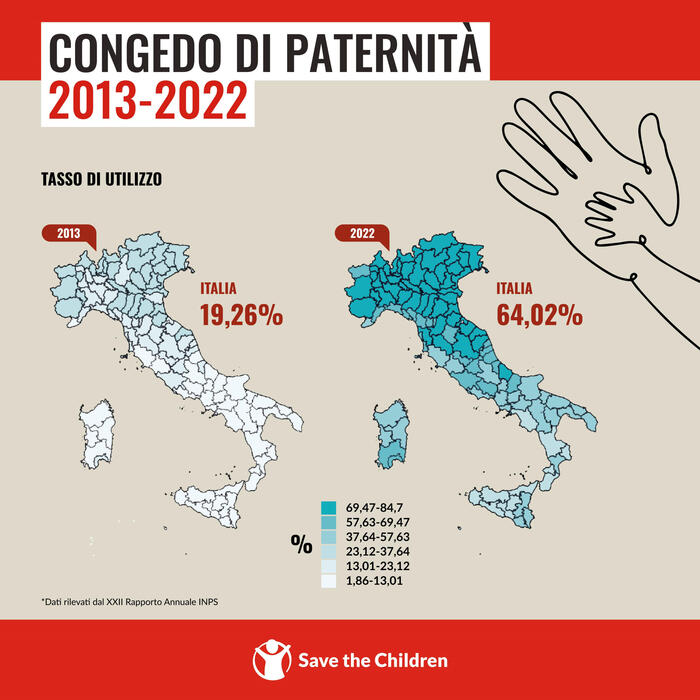Enlarge image
Father and son in central Helsinki
Photo: Tiina & Geir/Getty Images/Image Source
SPIEGEL:
Mr. Mäkynen, an official study recently found that women and men in Finland work almost the same amount of work and private lives for the first time.
Does that surprise you?
Matias Mäkynen:
In my own environment, I've experienced it that way for a long time.
This development has intensified during the pandemic.
Many men suddenly started working from home and everyone could see how challenging it is to combine job, family and housework.
But equality improved even before that.
That's why it didn't surprise me at all.
What has now been established is the result of decades of work.
SPIEGEL:
How did Finland manage that?
Mäkynen:
Finland is a small country.
After the war, there was a particularly strong cohesion in our society - and a need for workers.
This, together with our culture, has certainly ensured that equality was promoted earlier than elsewhere.
SPIEGEL:
With what measures?
Mäkynen: Back
in 1906, we were the first country in the world to give women the right to vote and stand for election.
In addition, early on we focused strongly on joint education and a wide range of childcare options.
In this way, women can also have a career and girls can get a good education.
The first laws against discrimination at work were introduced in the 1970s, when housewife marriage was still being promoted in other countries.
Today, women are particularly well qualified with us.
Of course we Social Democrats are proud of it and we take it up on the flags.
But I would say that most parties support it.
There is a broad consensus.
Because in the end it is also a waste of economic potential if you keep half the population away from working life.
SPIEGEL:
One finding of the current study is that fathers are more present today than mothers.
Do you have an explanation for this?
Mäkynen:
The family image has continued to change in recent years.
Today, Finnish influencers show how they take care of their family.
Being there for your children is seen as a sign of responsibility.
According to the study, Finnish fathers now spend more time with their children than their wives.
But the truth is that going to the playground is more pleasant than doing the dishes.
This is no different in Finland than in other countries.
When it comes to housework, women are still doing more.
SPIEGEL:
You are a young father yourself.
Whoever calls you sometimes hears children screaming in the background.
How do you divide up the work in the family?
Mäkynen:
I tried very hard to be there for my son.
When I came to Parliament, he was just six months old.
There are already many strong women in our government.
Prime Minister Sanna Marin is now known around the world, and more than half of her cabinet are women.
However, in Parliament I was the first man to take as much parental leave as his wife.
But I've never heard any stupid sayings about it.
Nevertheless, it is of course exhausting to work a lot and to be there for the family.
But actually I'm uncomfortable talking about it.
I was just trying to do what every mother does.
SPIEGEL:
Despite the successes, there are still clear differences in Finland: women mostly earn less, the bosses are often male.
Why isn't that changing?
Mäkynen:
A large part of it can be traced back to career choices.
We lack male nurses and female IT specialists.
This is actually changing slowly.
For many people, a lumberjack is still male, and a chief physician is male.
It's obviously ingrained in our culture.
We recently wanted to pass a comprehensive transparency law that would disclose salary differences.
The unions were very much in favour.
In business, however, there were reservations.
In the end we only reached a compromise.
Of course it's also about money.
SPIEGEL:
You are a member of the Finnish parliamentary committee for men's issues.
According to its own statements, it is the oldest such body worldwide.
What is it even needed for?
Mäkynen:
There are many reasons why we should take care of men.
Their health is often worse, they die earlier.
At the same time, they often have poorer chances of custody in the event of a divorce because women are considered the natural caregivers.
It's not fair.
And then unfortunately there is a problem with domestic violence in Finland.
All of this should be taken care of consciously.
And that's exactly what we've been trying to do since 1988.
SPIEGEL:
In recent years, gender discussions have increasingly been stylized as a culture war.
Do you experience that too?
Mäkynen:
When it comes to gender issues, feminism and trans rights, we often have shrill tones, too.
The right-wing populist »True Finns« keep trying to scandalize such issues.
But when it comes to specific concerns, I feel little of it.
Our political culture is characterized by respect.
We even agreed with the Conservatives to relax abortion laws.
Maybe that's a very Finnish look.
But I think most parties target women as well as men.
Not making a serious effort to look after them just seems very irresponsible to us.
This contribution is part of the Global Society project
Expand areaWhat is the Global Society project?
Under the title »Global Society«, reporters from
Asia, Africa, Latin America and Europe
report on injustices in a globalized world, socio-political challenges and sustainable development.
The reports, analyses, photo series, videos and podcasts appear in a separate section in the foreign section of SPIEGEL.
The project is long-term and is supported by the Bill & Melinda Gates Foundation (BMGF).
A detailed FAQ with questions and answers about the project can be found here.
AreaWhat does the funding look like in concrete terms?open
The Bill & Melinda Gates Foundation (BMGF) has been supporting the project since 2019 for an initial period of three years with a total of around 2.3 million euros - around 760,000 euros per year.
In 2021, the project was extended by almost three and a half years until spring 2025 under the same conditions.
AreaIs the journalistic content independent of the foundation?open
Yes.
The editorial content is created without the influence of the Gates Foundation.
AreaDo other media also have similar projects?open
Yes.
With the support of the Gates Foundation, major European media outlets such as The Guardian and El País have set up similar sections on their news sites with Global Development and Planeta Futuro respectively.
Did SPIEGEL already have similar projects? open
In recent years, DER SPIEGEL has already implemented two projects with the European Journalism Center (EJC) and the support of the Bill & Melinda Gates Foundation: the "Expedition ÜberMorgen" on global sustainability goals and the journalistic refugee project "The New Arrivals", within the framework of which several award-winning multimedia reports on the topics of migration and flight have been created.
Expand areaWhere can I find all publications on the Global Society?
The pieces can be found at SPIEGEL on the Global Society topic page.







